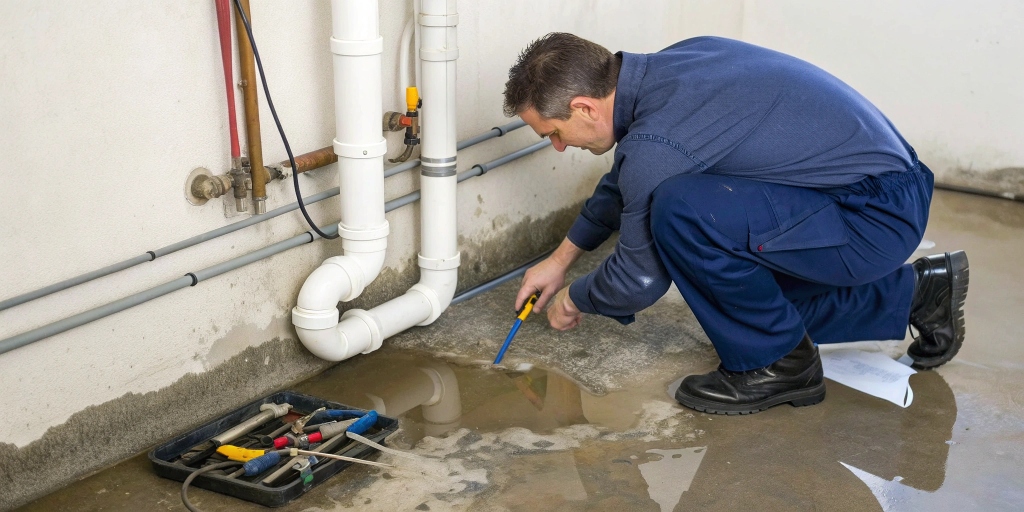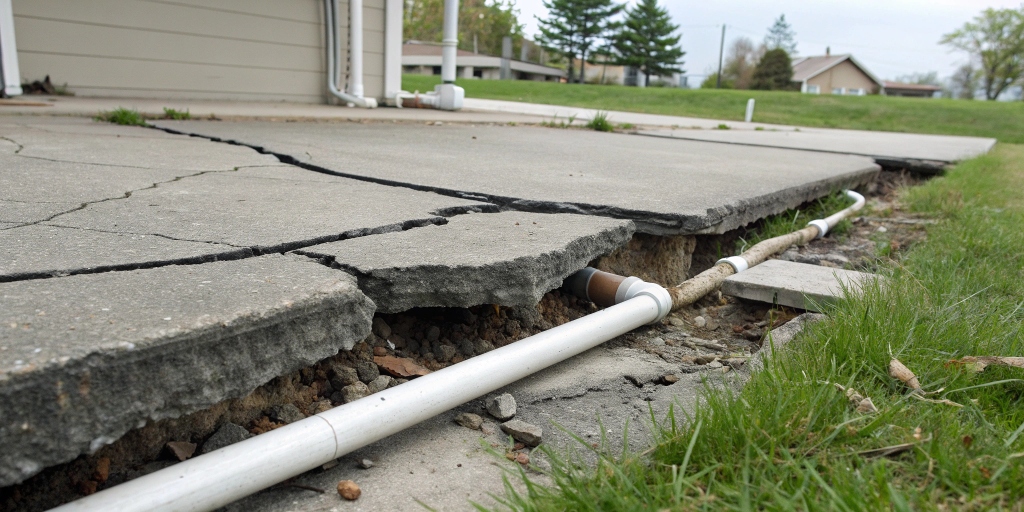Slab Leak Repair Cost in 2025 | What Every Homeowner Should Know
Imagine stepping onto your living room floor and feeling an unexpected warm spot underfoot, or opening your monthly water bill to find it’s doubled without any explanation. These subtle hints could signal a hidden disaster brewing beneath your home’s foundation—a slab leak. For many homeowners, discovering a water leak under the slab turns into a stressful and costly ordeal. But understanding the ins and outs of slab leak repair can help you act quickly, potentially saving thousands in damage. In this comprehensive guide, we’ll break down everything from detection to repair options, focusing on the all-important question: how much does slab leak repair cost? Whether you’re dealing with a potential issue or just want to stay informed, we’ll cover real-world insights to help you protect your home.
What Is a Slab Leak?
A slab leak occurs when pipes embedded in or beneath your home’s concrete foundation spring a leak. These pipes, often carrying water or sewage, are hidden from view, making issues hard to spot until they’ve escalated. Slab leaks are common in older homes built on concrete slabs, especially in regions with shifting soil like Texas or California. They can stem from corrosion, poor installation, high water pressure, or even ground movement from earthquakes or settling foundations.
Unlike visible plumbing problems, a slab plumbing leak can go unnoticed for months, leading to water damage, mold growth, and structural issues. If left unchecked, it might compromise your home’s foundation, turning a minor fix into a major renovation. Recognizing this early is key to minimizing the cost to repair a slab leak.
Signs You Might Have a Slab Leak
Catching a slab leak early can drastically reduce repair expenses. Here are some common warning signs to watch for:
- Unexplained High Water Bills: If your usage hasn’t changed but your bill has spiked, a hidden leak could be wasting hundreds of gallons daily.
- Sounds of Running Water: Hearing water flowing when all faucets are off? This phantom noise often points to a leak under the slab.
- Warm or Damp Spots on Floors: Hot water slab leaks can create warm patches on tile or concrete, while any leak might cause dampness or pooling water.
- Low Water Pressure: A sudden drop in pressure throughout the house suggests water is escaping before reaching your fixtures.
- Cracks in Walls or Floors: As water erodes the soil beneath, your foundation may shift, causing visible cracks.
- Mold or Mildew Odors: Excess moisture fosters mold growth, often with a musty smell.
- Foundation Movement: Doors that stick or windows that won’t close properly can indicate settling due to water saturation.
If you notice any of these, don’t delay—prompt action can prevent the average cost of a slab leak repair from ballooning due to secondary damage like foundation repairs.
How to Find a Water Leak Under Slab
Detecting a leak under the slab isn’t always straightforward, but there are steps you can take before calling in pros. Start with a simple DIY check: Turn off all water sources and monitor your water meter. If it continues to spin, you’ve got a leak somewhere. For slab-specific issues, feel for warm spots (indicating a hot water leak under the slab) or look for damp areas on floors.

For more accurate detection, professionals use advanced tools:
- Acoustic Listening Devices: These amplify the sound of escaping water to pinpoint the leak’s location.
- Infrared Cameras: They detect temperature differences caused by water, revealing hidden moisture without breaking concrete.
- Pressure Testing: Plumbers pressurize the lines and check for drops, isolating the problematic section.
- Smoke Testing: For sewer lines, smoke is introduced to reveal escapes through cracks.
If you’re handy, you might try a basic pressure test kit from a hardware store, but for precision, hire a leak detection specialist. Many homeowners turn to forums like Reddit for advice on “slab leak repair cost reddit” threads, where real experiences highlight the importance of early detection to avoid escalating expenses.
Methods to Fix Slab Leaks
Once located, fixing a slab leak involves several approaches, each with varying complexity and cost. The best method depends on the leak’s severity, location, and your home’s layout. Here’s a breakdown of common slab leak repair options:
- Spot Repair: Ideal for isolated leaks, this involves cutting into the concrete to access and fix the damaged pipe section. It’s straightforward but invasive, often requiring floor replacement afterward.
- Pipe Rerouting or Repiping: If the leak is extensive or pipes are old, plumbers may bypass the slab by rerouting lines through walls, ceilings, or attics. This avoids digging but can be more involved for whole-house systems.
- Tunneling: Workers dig tunnels under the foundation to reach pipes without breaking interior floors. It’s less disruptive inside but labor-intensive.
- Trenchless Repair (Epoxy Lining): A modern, minimally invasive option where an epoxy coating is applied inside the pipe to seal leaks. It’s quicker and often cheaper for suitable pipes.
- Pipe Bursting: For severely damaged lines, a new pipe is pulled through the old one, bursting it apart. This is effective for long runs but requires access points.
Choosing the right method impacts the overall slab water leak repair cost. For instance, epoxy lining might suffice for a minor hot water leak under slab repair, while repiping is better for recurring issues.
Understanding Slab Leak Repair Costs
Now, let’s address the elephant in the room: how much does it cost to repair a slab leak? Based on recent data, the average cost for slab leak repair ranges from $630 to $4,400, with most homeowners paying around $2,280. However, prices can climb to $6,750 or more for complex cases. These figures are for 2024-2025 and can vary by region—expect higher rates in high-cost areas like Los Angeles or Plano, TX, due to labor and material expenses.
Factors Affecting the Cost to Repair Slab Leak
Several elements influence the final bill for concrete slab leak repair cost:
- Leak Location and Accessibility: A leak under an easily accessible area, like a hallway, costs less than one beneath cabinets or load-bearing walls. In places like Dallas or Anthem, AZ, soil type and foundation depth can add to tunneling expenses.
- Repair Method: Spot repairs start at $500-$1,500, while full repiping can reach $4,500-$15,000 for larger homes. Trenchless options like epoxy often fall in the $500-$3,500 range, saving on demolition.
- Type of Leak: Hot water slab leak repair cost might be higher if it involves specialized handling for heated lines, potentially adding $200-$500.
- Extent of Damage: If water has caused mold, foundation cracks, or flooring ruin, remediation adds $1,000-$5,000 or more.
- Labor and Materials: Plumbers charge $45-$200 per hour, plus pipes ($0.50-$8 per foot) and concrete patching ($5-$10 per square foot). Emergency services or after-hours work inflate costs.
- Detection Fees: Initial leak detection averages $150-$400, but it’s essential for accurate repairs.
For a rough estimate, use a slab leak repair cost calculator online, inputting your home’s size and location. Homeowners in Costa Mesa or near me often find local quotes vary, so shop around. Remember, the cost to repair a water leak under the slab is an investment—delaying can lead to $10,000+ in water damage.
Average Cost Breakdown
- Basic Detection and Minor Fix: $300-$1,000
- Standard Slab Leak Repair: $1,500-$3,000
- Major Repiping or Tunneling: $4,000-$10,000+
- Additional Restoration: $500-$5,000 for flooring, mold removal, etc.
These averages align with reports from sources like HomeAdvisor and Angi, but always get multiple quotes. For instance, the average cost for slab leak repair in urban areas like Los Angeles, CA, might skew higher due to permitting and labor rates.
Prevention Tips to Avoid Costly Repairs
While not all slab leaks are preventable, proactive steps can reduce risks and keep your slab leak repair costs at bay:
- Regular Inspections: Schedule annual plumbing check-ups to catch corrosion early.
- Water Pressure Management: Keep pressure below 60 PSI; install a regulator if needed.
- Address Hard Water: Use softeners to prevent mineral buildup that corrodes pipes.
- Avoid Chemical Cleaners: Harsh drain chemicals can eat away at pipes over time.
- Insulate Pipes: In cold climates, protect against freezing and bursting.
- Monitor Soil Conditions: In expansive soil areas, maintain even moisture around your foundation.
- Install Leak Detectors: Smart sensors alert you to moisture or flow anomalies.
By following these, you can extend your plumbing’s life and avoid the surprise of a leak in the slab cost to repair.
FAQs About Slab Leak Repair
- How much does a slab leak cost to repair? As noted, averages hover around $2,280, but vary widely.
- Is slab leak repair covered by insurance? Often yes for sudden leaks, but not gradual wear—check your policy.
- How long does the repair take? Minor fixes: 1-2 days; repiping: up to a week.
- Can I DIY a slab leak repair? Not recommended—professional tools and expertise are crucial to avoid further damage.
Final Thoughts
Dealing with a slab leak can be daunting, but armed with knowledge about signs, detection, repair methods, and costs, you’re better equipped to handle it. The key is acting fast to prevent minor issues from becoming major headaches. If you suspect a problem, don’t wait—search for “slab leak repair services Costa Mesa” or your local area to find trusted pros.
Ready to safeguard your home? Contact a licensed plumber today for a free inspection and quote. It could save you from the high cost of slab leak repair down the line. Share your experiences in the comments below—what’s your biggest plumbing worry?
Find out more:
Why Athens, AL Homeowners Should Never Delay Fogged Window Glass Repair









